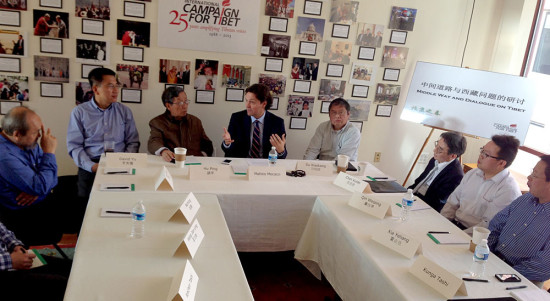
ICT President Matteo Mecacci welcomes meeting participants.
On October 17, 2014, the International Campaign for Tibet and Beijing Spring magazine jointly organized a roundtable discussion on the Middle Way and dialogue on Tibet in Washington DC at the office of the International Campaign for Tibet. Moderated by Hu Ping and Yu Dahai of Beijing Spring magazine, a number of Chinese scholars and writers, including Su Xiaokang, Chen Kuide, Xia Yeliang, and Qin Weiping attended the session. Others, including Yang Jianchi and Yu Jie, were not able to attend and sent their written remarks. The four hour long session was conducted in Chinese language and discussions took place on many aspects, including culture, social and political system, interpretation and implementation of Middle Way. A summary of some of the comments raised in the discussion are included below. Full video and written remarks will be made available on Beijing Spring magazine and Liaowang Xizang website for online viewing in the coming days.
“Tibet, Xinjiang, Taiwan, and Hong Kong are recognized as the ‘four special regions.’ The Chinese government uses the policy of ‘One Country Two Systems’ for Hong Kong today. This policy was originally derived from the policy being used for Tibet in the early 1950s. The problem is that the Communist Government of China does not keep its promises. According to current situation in Hong Kong, Tibet and Xinjiang’s today will be Hong Kong’s tomorrow, and Hong Kong’s today will be Taiwan’s tomorrow. The conditions [in China] for Middle Way to solve Tibet issue are not there yet however, the Middle Way will be accepted easily by the masses if they only they know the truth.”
“It is difficult to have a breakthrough on China-Tibet relation at this moment. However, the Middle Way, in long run, is the best way to solve political issues we face today. As the Tibetan people went into exile, it enabled Buddhism to spread all over the globe. His Holiness the Dalai Lama is the highest leader of Tibetan Buddhism, but most people around the world look to His Holiness the Dalai Lama as the highest leader of all Buddhists. This is a great wonder that has resulted from a policy of genocide against the Tibetan people by the Communist Government of China. Tibetan Buddhism will be one of the most influential religions in China in the future. The dreams for His Holiness’ returning to Tibet and making a huge impact in Chinese society are not impossible to realize some day via the Middle Way approach.”
“The issue of Nationality was one of most important reasons for the collapse of the Soviet Union. The Communist Party controlled everything in the Soviet Union. Chinese social system is similar to that of the former Soviet Union. If China does not change its policies on nationality issues, there is every possibility that it could go the same way as the Soviet Union did. However, it is not possible to resolve the nationalities issues in China via independence but the fulcrum is for Xi’s “China’s Dreams” and the Dalai Lama’s “Middle Way” to meet each other. If H.H. the Dalai Lama could visit Wutai Shan Mountain, it would be a big breakthrough for the overall situation of the issue.”
“The biggest problem is that discussing Tibet related issues based on the truth is academically forbidden area in China today. Chinese Government does not allow scholars to study the Tibet issue, Tibetan history or the current situation in Tibet freely. There are few Chinese scholars who study Tibetan history and Tibet issue.”
“To the Chinese Government, Tibet issue is seen as an issue which threatens the ruling power. To the Tibetan people, it is an issue of protection of their culture and H. H. the Dalai Lama’s return to Tibet. It is possible that the leaders of Chinese Communist Party know more about the Tibet issue than we do, but they do not want to resolve this issue so far. The value of Tibetans’ human rights should be respected. Tibetan people’s rights of self-determination must be respected as well. China must be a federal democratic state in the future. Therefore, His Holiness the Dalai Lama’s Middle Way is the best method with political wisdom to resolve the issue. Teaching people in China the truth about His Holiness the Dalai Lama, his thoughts, his words, and his Middle Way should be a top priority. Once people in China know the truth, they will support Middle Way. Internet is the most effective way to achieve this mission.”
“The Middle Way is an excellent idea or concept. The world can be changed by an idea. In order to do that, first of all, we need to win the support from the level of institutions, system and cultural aspects. Secondly, Middle Way should have a broad space for interpretation. It shouldn‘t be narrowed in political slogans. Thirdly, the biggest obstacle for Middle Way is the Chinese political system and culture which emphasizes great unity and political tradition; and the Regional Autonomous Political System is also an obstacle. How to implement is through the establishment of a federal system that represents a middle way.”
“Middle way is the only way to resolve the Tibet issue. Mainly it is dependent on whether His Holiness will be able to return or not.”

